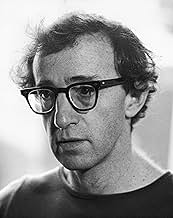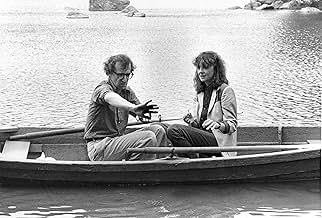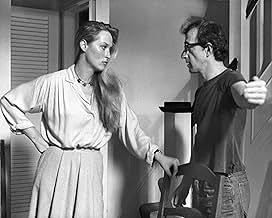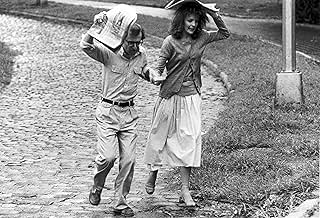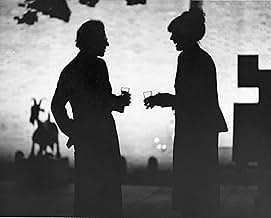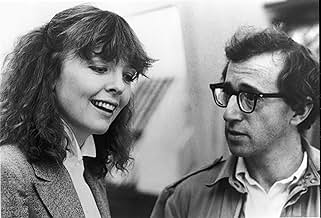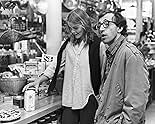ÉVALUATION IMDb
7,8/10
152 k
MA NOTE
Les angoisses et hésitations sentimentales d'un intellectuel new-yorkais.Les angoisses et hésitations sentimentales d'un intellectuel new-yorkais.Les angoisses et hésitations sentimentales d'un intellectuel new-yorkais.
- Nommé pour 2 oscars
- 16 victoires et 24 nominations au total
Anne Byrne Hoffman
- Emily
- (as Anne Byrne)
Avis en vedette
'Manhattan' looks beautiful in black and white. It is definitely Woody Allen's best. Two years after 'Annie Hall' we have Woody Allen and Diane Keaton together again. Allen plays Isaac who is dating the 17-year old Tracy (Mariel Hemingway). He has a friend, the married Yale (Michael Murphy), who is having an affair with Mary (Diane Keaton). Isaac falls in love with Mary and stops seeing Tracy to start things with Mary. In a sub-plot we have the ex-wife of Isaac publishing a book about their sex-life. Now she is living with a woman. The ex-wife Jill is played by Meryl Streep. Her appearances are short and not very often but she is more than great in her scenes.
'Manhattan' is even better than the great 'Annie Hall'. The black and white cinematograpy, done with a good reason, gives a little extra to the movie. Like I said Streep is terrific and so are Allen, Keaton and especially Hemingway (she was nominated for an Oscar). The monologues Allen had in 'Annie Hall' are still present, smart, interesting and funny. A great story, very intelligent, of course written (and directed) by Woody Allen himself.
'Manhattan' is even better than the great 'Annie Hall'. The black and white cinematograpy, done with a good reason, gives a little extra to the movie. Like I said Streep is terrific and so are Allen, Keaton and especially Hemingway (she was nominated for an Oscar). The monologues Allen had in 'Annie Hall' are still present, smart, interesting and funny. A great story, very intelligent, of course written (and directed) by Woody Allen himself.
10tvspace
Manhattan is an exhilarating American romance set against the backdrop of New York of the late 70's: my favorite New York, the New York of painters, poets, punks, and Pauline Kael. Three great, very American talents -- Woody Allen, Gordon Willis, and George Gershwin -- intertwine their respective gifts to create a comedy that manages to satisfy both the brain and the heart, and even, perhaps, the lower regions.
Allen is so brainy and such a nebbish that he can get away with gestures that would be painfully sentimental in the hands of any other director: when he begins the movie with fireworks cut to Gershwin, it isn't to soften you up for a soap opera, but to remind you that however much his neuroses may seem to drive the scenes, its the love of New York that drives the movie.
The entire cast is note perfect: Meryl Streep as his caustic bisexual ex-wife, Diane Keaton as a nervous journalist from Philadelphia, and especially Mariel Hemingway, whose performance as Allen's 17-year old girlfriend is charming, heartbreaking, and wise.
Allen's comedy here is at its absolute finest. The fact that it is interwoven with a genuinely moving love story told with a subtlety and indirection that is unheard of in today's mainstream cinema only makes the laughs that much richer.
Gordon Willis' cinematography is good enough for the Museum of Modern Art. Scene after scene leaves a grin on your face as his moving (in both senses) black and white photography floats across the screen.
And finally underlying everything is the music of George Gershwin, whose exubertant melodies propel the movie forward at every turn.
This is Woody Allen's best movie, a great movie, and an American movie in the best sense. As an homage to the city of New York it will surely remain unsurpassed.
Allen is so brainy and such a nebbish that he can get away with gestures that would be painfully sentimental in the hands of any other director: when he begins the movie with fireworks cut to Gershwin, it isn't to soften you up for a soap opera, but to remind you that however much his neuroses may seem to drive the scenes, its the love of New York that drives the movie.
The entire cast is note perfect: Meryl Streep as his caustic bisexual ex-wife, Diane Keaton as a nervous journalist from Philadelphia, and especially Mariel Hemingway, whose performance as Allen's 17-year old girlfriend is charming, heartbreaking, and wise.
Allen's comedy here is at its absolute finest. The fact that it is interwoven with a genuinely moving love story told with a subtlety and indirection that is unheard of in today's mainstream cinema only makes the laughs that much richer.
Gordon Willis' cinematography is good enough for the Museum of Modern Art. Scene after scene leaves a grin on your face as his moving (in both senses) black and white photography floats across the screen.
And finally underlying everything is the music of George Gershwin, whose exubertant melodies propel the movie forward at every turn.
This is Woody Allen's best movie, a great movie, and an American movie in the best sense. As an homage to the city of New York it will surely remain unsurpassed.
Woody Allen once said that, whereas Scorsese had generated a host of imitators, he had generated none. This may be true; films like Manhattan certainly come along far too infrequently.
That this is such a gorgeous film may strike those following the formulaic, Hollywood approach to cinema as strange and heretical. The story is unexciting (restless male in love triangle), most of the characters are unsympathetic, at least on the surface (particularly Isaac), Allen leaves lose ends lying around all over the place, and there's certainly no action (unless you count the car-chase-without-a-chase-scene involving Diane Keaton, Woody Allen and a VW Beetle).
So why should any self-respecting member of the MTV generation spend time on this film? Well, here are a few reasons.
The script is wit of the highest order. This is not gag-a-minute humour like Friends, but an altogether more acute art form stemming from character, some wonderful dialogue and a fair amount of darkness (I love the bit about Isaac trying to run over his ex-wife's lover). Allen is also prepared to turn his biting satire to personal issues, such as being Jewish. Just don't expect someone to look shrug their shoulders, slap their forehead and with mid-rising intonation say d'uh! It's not that kind of comedy.
Then there is the gorgeous cinematography. Woody loves Manhattan and you can certainly tell. If there is one criticism of the film, it is that it leaves a rather picture postcard impression of the city, but I suppose if it's love, then it's love. Much of the film appears to have been shot at either sunrise or sunset to soften the light, and there are spectacular views of the towers, bridges and waterways of America's finest metropolis.
Then, I suppose, there is the fact that Manhattan is probably the archetypal Woody Allen film. Other films may be better, like Annie Hall or Hannah and Her Sisters but, in Manhattan, all the elements of Allen's style are in perfect balance. There's the jazz, the neurotic, unsympathetic lead, the choice between stable and highly-strung women, the self-mocking humour (hilariously done in the opening voice-over), the railing against intellectual snobbery, the deep unease with popular culture.
And there are great performances. Allen is at his most difficult and in some ways his least likable. As Isaac, he's trying to do the right thing, but is rarely selfless enough to follow through with it. Diane Keaton is great as Mary, the lynchpin between the two love triangles vain, pretentious and yet you can see why Isaac falls for her. Well, all the actors are great, and very believable, but special mention must go to Meryl Streep, who manages to steal the show with her tiny cameo as Isaac's ex-wife, writing a book about their break-up and living with their son and her lover. She is magnificent.
Of course, the film will also do nothing to dispel the popular rumour that New Yorkers are neurotic, self-obsessed and self-indulgent at least that narrow social circle Allen so often writes about. If you don't mind that, though (and I'm English, so what do I care) you're in for a treat. As with the city itself, the memories of this film will stay with you forever.
That this is such a gorgeous film may strike those following the formulaic, Hollywood approach to cinema as strange and heretical. The story is unexciting (restless male in love triangle), most of the characters are unsympathetic, at least on the surface (particularly Isaac), Allen leaves lose ends lying around all over the place, and there's certainly no action (unless you count the car-chase-without-a-chase-scene involving Diane Keaton, Woody Allen and a VW Beetle).
So why should any self-respecting member of the MTV generation spend time on this film? Well, here are a few reasons.
The script is wit of the highest order. This is not gag-a-minute humour like Friends, but an altogether more acute art form stemming from character, some wonderful dialogue and a fair amount of darkness (I love the bit about Isaac trying to run over his ex-wife's lover). Allen is also prepared to turn his biting satire to personal issues, such as being Jewish. Just don't expect someone to look shrug their shoulders, slap their forehead and with mid-rising intonation say d'uh! It's not that kind of comedy.
Then there is the gorgeous cinematography. Woody loves Manhattan and you can certainly tell. If there is one criticism of the film, it is that it leaves a rather picture postcard impression of the city, but I suppose if it's love, then it's love. Much of the film appears to have been shot at either sunrise or sunset to soften the light, and there are spectacular views of the towers, bridges and waterways of America's finest metropolis.
Then, I suppose, there is the fact that Manhattan is probably the archetypal Woody Allen film. Other films may be better, like Annie Hall or Hannah and Her Sisters but, in Manhattan, all the elements of Allen's style are in perfect balance. There's the jazz, the neurotic, unsympathetic lead, the choice between stable and highly-strung women, the self-mocking humour (hilariously done in the opening voice-over), the railing against intellectual snobbery, the deep unease with popular culture.
And there are great performances. Allen is at his most difficult and in some ways his least likable. As Isaac, he's trying to do the right thing, but is rarely selfless enough to follow through with it. Diane Keaton is great as Mary, the lynchpin between the two love triangles vain, pretentious and yet you can see why Isaac falls for her. Well, all the actors are great, and very believable, but special mention must go to Meryl Streep, who manages to steal the show with her tiny cameo as Isaac's ex-wife, writing a book about their break-up and living with their son and her lover. She is magnificent.
Of course, the film will also do nothing to dispel the popular rumour that New Yorkers are neurotic, self-obsessed and self-indulgent at least that narrow social circle Allen so often writes about. If you don't mind that, though (and I'm English, so what do I care) you're in for a treat. As with the city itself, the memories of this film will stay with you forever.
Woody Allen started off making outrageous, cheap, hit-and-miss, unpretentious comedies, the best of which were probably "Love and Death" and "Sleeper." The comedy became more rooted in reality and grafted onto an engaging story of lost love in "Annie Hall," which I think is still his best film. After that, "Interiors." Ka-Boom. Since then there have been no more absurd comedies, several gloomy dramas, and many more or less successful attempts to blend comedy with serious themes.
This is one of the dark comedies and didn't work for me. Allen is going with a high-school girl, falls for a woman nearer his own age, alienates his close friend, and finally decides -- too late -- that the younger girl is his soul mate. It ends ambiguously with her leaving for Europe. The plot is out of a soap opera. It does have some witty lines (almost all of them given to Allen himself) and a lot of inside New Yorker intellectual allusions, but, aside from the Gershwin score, isn't worth seeing twice. Really, it's pretty boring. The performances aren't bad, but Allen doesn't challenge himself either. It's his old neurotic, stuttering, put-upon persona that is by now more than familiar enough. There's just nothing new.
It isn't that Allen had run out of ideas by 1979 because he's made some successful films since then -- "Hollywood Ending" and "Broadway Danny Rose", for instance. But "Manhattan" is one of the many that simply got by me. It didn't seem charming. It seemed repetitious and pointless. I didn't bother counting the times someone meets another and says, "Hiii," using the contours of the fourth tone in Mandarin Chinese. And no one seems to say it just once during a given encounter, but several times. "Hii, hii -- how AHH you?"
I kept waiting for one of two things to happen. Either IT takes off or I get drawn in. But neither contingency was realized. I cared about the entanglements in "Annie Hall," but here it didn't matter to me who wound up with whom, and I never got the feeling that it mattered much to Allen either.
This is one of the dark comedies and didn't work for me. Allen is going with a high-school girl, falls for a woman nearer his own age, alienates his close friend, and finally decides -- too late -- that the younger girl is his soul mate. It ends ambiguously with her leaving for Europe. The plot is out of a soap opera. It does have some witty lines (almost all of them given to Allen himself) and a lot of inside New Yorker intellectual allusions, but, aside from the Gershwin score, isn't worth seeing twice. Really, it's pretty boring. The performances aren't bad, but Allen doesn't challenge himself either. It's his old neurotic, stuttering, put-upon persona that is by now more than familiar enough. There's just nothing new.
It isn't that Allen had run out of ideas by 1979 because he's made some successful films since then -- "Hollywood Ending" and "Broadway Danny Rose", for instance. But "Manhattan" is one of the many that simply got by me. It didn't seem charming. It seemed repetitious and pointless. I didn't bother counting the times someone meets another and says, "Hiii," using the contours of the fourth tone in Mandarin Chinese. And no one seems to say it just once during a given encounter, but several times. "Hii, hii -- how AHH you?"
I kept waiting for one of two things to happen. Either IT takes off or I get drawn in. But neither contingency was realized. I cared about the entanglements in "Annie Hall," but here it didn't matter to me who wound up with whom, and I never got the feeling that it mattered much to Allen either.
I used to hold this film as somewhat of a sacred cow when I first saw it in 1979. I was a proscribed Woody fan and
although I still like a few of his movies, this is no longer one of them, on recent review.
I recently purchased copies of Manhattan and Annie Hall.
I watched the latter first and it charmed my socks off again. One classic scene after another signals the height of Allen's art in this hilarious masterwork. Manhattan is a different story.
Perhaps my recent viewing of Wild Man Blues has hipped
me to what an whining, pampered egomaniac Mr. Allen is.
Perhaps it's the irony of his Chaplin-like dalliances with young women that have set me against him. But I now watch Manhattan
and see a pathetic, overblown Allen literally feeding lines to his
fellow actors to give him some smarmy comeback that never fails to show how intellectually superior he is. Different from Annie Hall, Allen is no longer the underdog but an ugly, obnoxious
over-lord...
His characters in Manhattan, are cardboard. They are not real and
the situations are not real. I have no feeling for anyone in this
movie, except Woody, who I feel contempt for, given his massive
and unfunny self-indulgence. It's pathetic to see Allen set up
Hemingway with lines that a teenager would never say in a million
years, just to trump up his flaccid ego. Everyone in this movie actually feeds him lines to trump up his ego.
Like Stardust Memories, this one shows Woody at his self- indulgent worst. This movie looks wonderful and sounds wonderful with the Gershwin score, but on further review, this
one's hollow and ultimately a maddening tribute to an egomaniac.
although I still like a few of his movies, this is no longer one of them, on recent review.
I recently purchased copies of Manhattan and Annie Hall.
I watched the latter first and it charmed my socks off again. One classic scene after another signals the height of Allen's art in this hilarious masterwork. Manhattan is a different story.
Perhaps my recent viewing of Wild Man Blues has hipped
me to what an whining, pampered egomaniac Mr. Allen is.
Perhaps it's the irony of his Chaplin-like dalliances with young women that have set me against him. But I now watch Manhattan
and see a pathetic, overblown Allen literally feeding lines to his
fellow actors to give him some smarmy comeback that never fails to show how intellectually superior he is. Different from Annie Hall, Allen is no longer the underdog but an ugly, obnoxious
over-lord...
His characters in Manhattan, are cardboard. They are not real and
the situations are not real. I have no feeling for anyone in this
movie, except Woody, who I feel contempt for, given his massive
and unfunny self-indulgence. It's pathetic to see Allen set up
Hemingway with lines that a teenager would never say in a million
years, just to trump up his flaccid ego. Everyone in this movie actually feeds him lines to trump up his ego.
Like Stardust Memories, this one shows Woody at his self- indulgent worst. This movie looks wonderful and sounds wonderful with the Gershwin score, but on further review, this
one's hollow and ultimately a maddening tribute to an egomaniac.
Le saviez-vous
- AnecdotesMeryl Streep shot her scenes during breaks in filming Kramer contre Kramer (1979).
- GaffesIn the first scene at Elaine's, as Isaac is beginning to say something, two people (presumably customers of the restaurant, as it was running while they were shooting) walk in front of the camera. Isaac laughs, and quickly recovers with an impromptu remark about how his girlfriend has to go and do homework.
- Citations
Isaac Davis: All the times I come over here, I can't understand how you can prefer her to me.
Jill: You can't understand that?
Isaac Davis: No. It's a mystery to me.
Jill: Well, you knew my history when you married me.
Isaac Davis: I know. My analyst warned me, but you were so beautiful that I got another analyst.
- Générique farfeluOne of the very few Woody Allen films to not have traditional opening credits, save the production company bumper (United Artists), and the film title MANHATTAN is seen as a long vertical flashing bright neon sign, located on the side of a New York City building, and is seen for under seven seconds just before Woody Allen narrates his first line.
- ConnexionsEdited into Intimate Portrait: Diane Keaton (2001)
- Bandes originalesRhapsody in Blue
(1924)
Music by George Gershwin
Performed by The New York Philharmonic
Conducted by Zubin Mehta
Piano soloist: Paul Jacobs
Music director: Zubin Mehta
Meilleurs choix
Connectez-vous pour évaluer et surveiller les recommandations personnalisées
Détails
Box-office
- Budget
- 9 000 000 $ US (estimation)
- Brut – États-Unis et Canada
- 39 946 780 $ US
- Fin de semaine d'ouverture – États-Unis et Canada
- 485 734 $ US
- 29 avr. 1979
- Brut – à l'échelle mondiale
- 40 194 067 $ US
- Durée1 heure 36 minutes
- Couleur
- Mixage
- Rapport de forme
- 2.39 : 1
Contribuer à cette page
Suggérer une modification ou ajouter du contenu manquant



